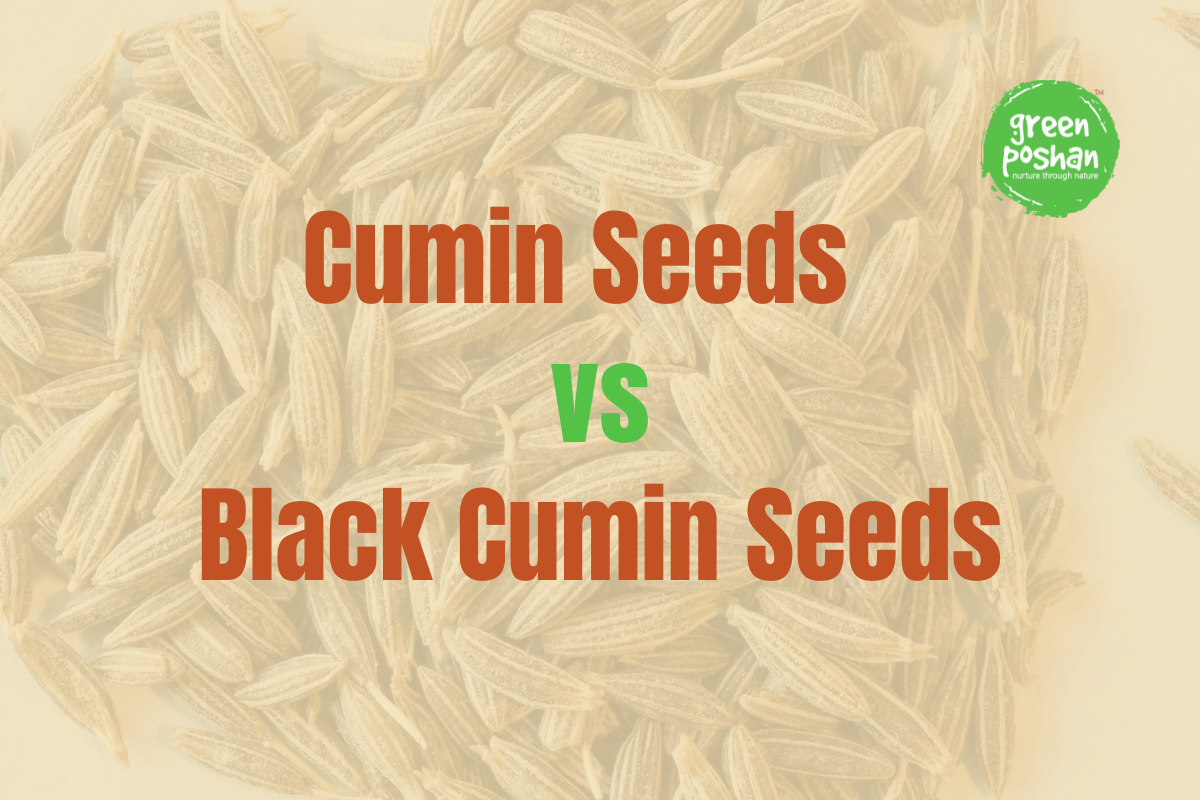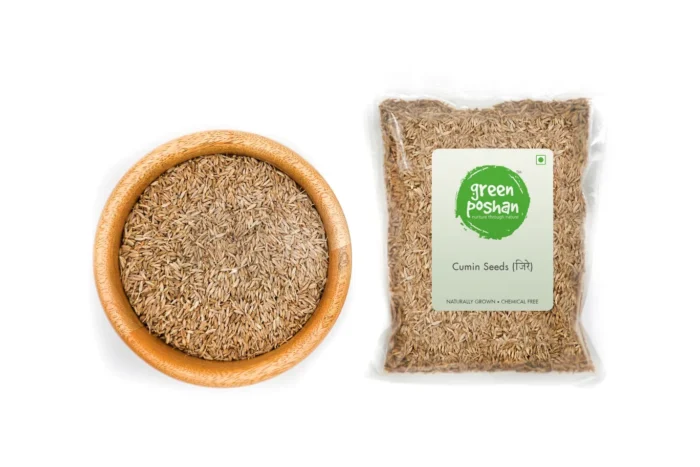Spices have always been an integral part of cooking, not just for flavor but also for health benefits. Among these, cumin seeds and black cumin seeds (kalonji) are two powerful options. While their names sound similar, their nutritional profiles, health benefits, and uses vary significantly.
At Green Poshan, we ensure you get high-quality cumin seeds that are pure, unadulterated, and packed with natural nutrients. In this guide, we will explore:
- What cumin seeds and black cumin seeds are
- Their health benefits
- Differences between them
- Tips to include both in your diet
- Which one is better for overall health
By the end of this article, you’ll know how to make an informed choice and incorporate these seeds into your daily routine for maximum wellness.
Cumin Seeds — 100g
Bring bold flavour and rich aroma to your kitchen with Green Poshan Cumin Seeds. Sourced from naturally grown cumin plants, these jeera seeds are sun-dried and carefully cleaned to preserve their earthy taste and digestive qualities. Known for their sharp, warm notes and distinct fragrance, cumin seeds are a staple in Indian households and feature in a variety of cuisines across the world.
Cumin seeds, commonly known as jeera in Hindi, are dried seeds of the Cuminum cyminum plant. They’re widely used as a spice to add warmth and earthiness to Indian, Middle Eastern, and Mexican dishes. Cumin seeds also hold a prominent place in Ayurvedic remedies for digestion and overall wellness.
What Are Cumin Seeds?
It, also known as Jeera, are small, elongated seed with a warm, earthy flavor. They are widely used in Indian, Middle Eastern, and Latin American cuisines.
Nutritional Profile of Cumin Seeds
- Rich in iron – Supports red blood cell production and prevents anemia
- Contains antioxidants – Protects cells from oxidative damage
- Source of dietary fiber – Aids digestion and promotes gut health
- Contains essential oils – Helps improve metabolism
Culinary Uses: These are versatile: they can be used in tempering, soups, stews, rice, and teas. Their warm flavor makes them ideal for both savory and sweet dishes.
At Green Poshan, our cumin seeds are carefully sourced to retain maximum flavor, nutrients, and freshness, ensuring that every dish you make is both tasty and nourishing.
What Are Black Cumin Seeds (Kalonji)?
Black cumin seeds, or kalonji, are tiny black seeds with a slightly bitter, peppery taste. They are often mistaken for regular cumin seeds, but their properties and health benefits are distinct.
Nutritional Profile of Black Cumin Seeds
- Contains thymoquinone, a potent antioxidant and anti-inflammatory compound
- Rich in essential fatty acids and minerals like calcium, iron, and zinc
- Helps support immunity and metabolism
Culinary Uses: Kalonji is used in pickles, breads, spice mixes, and even consumed as a supplement for targeted health benefits. Its distinct flavor can enhance both traditional and modern recipes.
Key Differences Between Cumin Seeds and Black Cumin Seeds
| Feature | Cumin Seeds (Jeera) | Black Cumin Seeds (Kalonji) |
| Flavor | Warm, earthy, slightly sweet | Peppery, slightly bitter |
| Color & Size | Light brown, elongated | Small, black, angular |
| Common Uses | Cooking, teas, digestion remedies | Baking, pickles, medicinal use |
| Active Compounds | Cuminaldehyde, antioxidants | Thymoquinone, essential oils |
| Primary Health Focus | Digestion, iron, antioxidant support | Immunity, anti-inflammatory, heart and liver support |
Summary: Both seeds are nutritionally valuable, but black cumin seeds offer more medicinal properties, while regular cumin seeds are ideal for daily culinary and wellness use.
Health Benefits of Cumin Seeds
- Improves Digestion: It stimulates digestive enzymes, reduce bloating, and promote nutrient absorption.
- Rich in Iron: Regular consumption supports red blood cell production and prevents anemia.
- Boosts Immunity: Antioxidants in cumin seeds help fight free radicals and support overall health.
- Supports Weight Management: The fiber and protein in cumin seeds promote satiety and help control calorie intake.
- Anti-inflammatory Properties: Cuminaldehyde reduces minor inflammation naturally.
- Enhances Metabolism: Regular use can improve fat metabolism and support energy production.
- Balances Electrolytes: These are a good source of potassium and magnesium, supporting heart and muscle function.
Tip: Brew cumin seeds tea or add them to curries and rice dishes daily for maximum health benefits.
Health Benefits of Black Cumin Seeds (Kalonji)
- Boosts Immunity: Thymoquinone in kalonji enhances immune response and helps fight infections.
- Supports Heart Health: Helps maintain healthy cholesterol and blood pressure levels.
- Promotes Liver Function: Acts as a detoxifying agent for the liver.
- Anti-inflammatory & Antioxidant: Reduces oxidative stress and inflammation in the body.
- Blood Sugar Management: May help stabilize glucose levels and improve insulin sensitivity.
- Supports Respiratory Health: Kalonji is used in traditional remedies for asthma and cough.
- Enhances Skin & Hair Health: Rich in fatty acids and antioxidants for glowing skin and stronger hair.
Usage Tip: Take 1/2 teaspoon of black cumin seeds daily with honey or sprinkle on meals to enjoy its medicinal benefits.
Which One Should You Choose?
The choice depends on your health goals:
- Cumin Seeds: Ideal for improving digestion, supporting metabolism, and enhancing general wellness. Great for daily use in cooking.
- Black Cumin Seeds (Kalonji): Best for targeted health benefits, like boosting immunity, reducing inflammation, and supporting heart and liver health.
Pro Tip: Combine both seeds in your diet to enjoy the best of both worlds. Use cumin seeds in everyday meals and add kalonji in small amounts for medicinal and therapeutic benefits.
How to Include Cumin and Black Cumin Seeds in Your Diet
Cumin Seeds (Jeera):
- Add to curries, soups, and rice dishes
- Use in tempering for vegetables and lentils
- Brew as cumin tea to aid digestion
Black Cumin Seeds (Kalonji):
- Sprinkle on breads, flatbreads, or roasted vegetables
- Mix with honey or warm water for immunity boost
- Add to pickles and spice blends for flavor and medicinal support
Safety Tips
- Both seeds are safe in culinary quantities.
- Avoid large amounts of kalonji; its potent compounds can be strong in excess
- Pregnant or nursing women should consult a doctor before using it as a supplement.
- Store seeds in airtight containers in a cool, dry place to preserve flavor and nutrients.
Final Thoughts
Both cumin seeds and black cumin seeds (kalonji) are valuable additions to a healthy diet. Cumin seeds support digestion, metabolism, and general wellness, while black cumin seeds provide potent immunity, anti-inflammatory, and heart-supporting benefits.
For maximum results, incorporate Green Poshan cumin seeds in everyday cooking and add small amounts of black cumin seeds for targeted health support. Together, these seeds can enhance your meals, boost your health, and offer natural wellness benefits.








